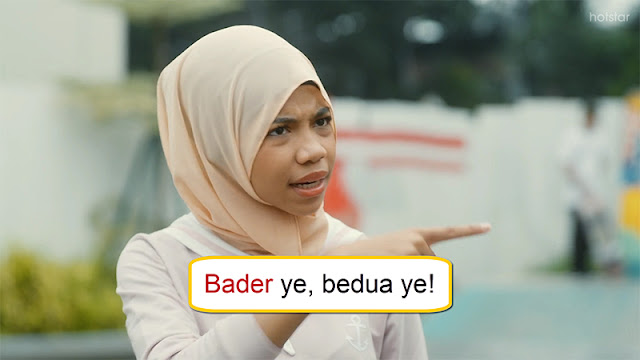- Get link
- X
- Other Apps
Posted by
Iman Prabawa
on
- Get link
- X
- Other Apps
Halo semuanya, ketemu lagi dengan saya, Iman Prabawa. In this article, I want to talk to you about the meaning of the word [bader] in the Indonesian language. As always, we will see examples from movies, youtube videos, and whatnot where the word [bader] is spoken.
If you have any questions regarding the Indonesian language, you can ask me directly. You can see how to do that on my About Me page.
If you are a beginner in the Indonesian language, you can learn step by step with My Lesson Here.
Shall we talk about it now? Okay, let's dive in.
Meaning of Bader In the Indonesian Language
[Bader] is a slang term. When you act [bader], it means you act naughty or badly behaved. The synonyms for [bader] in the Indonesian language are [nakal] and [bandel].
How to Pronounce Bader
Here is how you pronounce [bader] in the Indonesian language.
Next, we will watch examples where the word [bader] is used.
Examples of Bader In Use
The first scene we are about to watch is taken from Wedding Agreement: The Series, Season 1, Episode 2 (2022). Let's watch the clip below.
The boy: Wuh, bagus nih! Bisa ikut ASEAN game nih Ami nih. (Wow, this is awesome! Ami can participate in ASEAN games with this.)
The girl: Iye, menang die tuh lawan Pilipina. (Yeah, she will win against the Philippines.)
The boy: Iye. (Agreed.)
Ami: Nih, nih, nih, nih, nih! Kan udah gue bilangin jangan rekam-rekam. Bader ye, bedua ye! (Hey, hey, hey, hey, hey! I told you guys not to record me. You naughty!)
The boy: Ya ampun, mi. Loe tu tadi mainnya jago banget. Ini kalo gue upload bisa viral. (Oh my God, mi. You skate really well. If I upload this to the internet, you'll be famous.)
The girl: FYP loe, mi! (You'll be in FYP in Tiktok, mi!)
The boy: Kalo ngga diundang podcastnya om Deddy. (If not, you'll be invited to Mr. Deddy's podcast.)
The girl: Nah! Close to the door, loe! (Agree! The one that has a 'close the door' tagline in it!)
The boy: Hmm. (Yes.)
Ami: Engga, ngga. Gua ngga peduli yang gitu-gituan. Gua ngga mau. Ye? (No, nope. I don't care about those kinds of things. I'm not interested. Okay?)
The girl: Norak, loe! Katro! Instagram aja kaga punya! Kalah loe ama mak gua. (Oh my God, you're so outdated! You don't even have an Instagram account! Even my mother has one.)
Ami: Instagram gue ngga punya. Apalagi Whatsapp, Facebook, Line.. Ee, gue ga main begitu-begituan. Ye? (I don't have an Instagram account. I also don't have Whatsapp, Facebook, Line.. I'm not interested in those things. Okay?)
In this scene, Ami is playing skateboarding, and then two of her friends are documenting what Ami did with their cellphones. Ami then stops what they are doing and tells them that she has told them before not to record her skateboarding.
Vocabulary From the Scene
[Bagus] = good, awesome.
[Udah] is a common reduction for [sudah] = already.
[Iye] = [iya] = yes. Betawi people usually change the last letter [a] into [e], like [iya] into [iye], [dia] into [die].
[Die] = [dia] is a third person pronoun but [dia] or [die] has a non gender-related.
[Bilangin] is the casual way of saying [katakan]. [Kan udah gue bilangin jangan rekam-rekam] <--- if I change this sentence into a formal one, it would become [Kan sudah saya katakan jangan merekam (I told you guys not to record me)].
[Bedua] = [berdua] = the two of them.
[Loe] is informal for [Anda] = you. To learn more about this, you can read my article, Loe Meaning In Bahasa.
[Gua] is informal for [saya] = I. To learn more about this, you can read my article, Gua Meaning In Bahasa.
[Jago] is when you do something very well.
[Diundang] = invited.
[Engga] = [ngga] = [ga] = no.
When the girl said [close to the door], she meant Deddy Corbuzier's podcast with a tagline 'close the door' in it. But she just said it wrongly.
[Gua ngga peduli] = I don't care.
[Yang gitu-gituan] = something like that, those kinds of things.
[Norak] and [katro] have the same meaning that is something lame, dorky, corny, or tacky. But in this context, it means that Ami is outdated and not following the trends.
[Ama] is a common reduction for [sama] = with.
[Kaga] means no.
[Kaga punya] = don't have.
[Kalah loe ama ... (someone)] <--- this phrase is usually used when you are comparing someone with someone that is better. The girl says this, "Instagram aja kaga punya. (You don't even have an Instagram account." And then the girl compares her mother with Ami, saying something like, "Even my mother has an Instagram account, but you don't have."
[Kalah] literally means lost.
[Mak] is a common reduction for [emak] = mother.
[Mak gue] = my mother.
[Begitu-begituan] = [yang gitu-gituan] = those kinds of things, things like that.
[Ye?] = okay?
Read also: Dibawa Santai Aja Meaning In Bahasa
I guess this is all for now. If I find another example, Insha Allah, I will update this article again. Thanks a lot for reading this article, and I'll talk to you soon. Bye now.
- Get link
- X
- Other Apps
Hello, I'm Iman Prabawa a.k.a Pak Guru Iman. I love to share about languages. My Instagram, @pakguruiman


Comments
Post a Comment